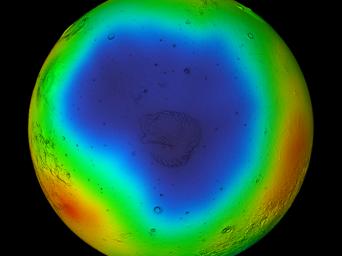
|
Summer in Mars’ North Polar Region
- Click the image above for a larger view
- Full-Res JPEG (2560 x 1918) (337.8 kB)
- Full-Res TIFF (2560 x 1918) (10.2 MB)
Caption:
Observations by NASA's 2001 Mars Odyssey spacecraft show a summertime view of the north polar region of Mars in intermediate-energy, or epithermal, neutrons. The map is based on data acquired by the high-energy neutron detector, one of the instruments in Odyssey's gamma-ray spectrometer suite. Soil enriched by hydrogen is indicated by the purple and deep blue colors on the map, which show a low intensity of epithermal neutrons. Progressively smaller amounts of hydrogen are shown in the colors light blue, green, yellow and red. The hydrogen is believed to be in the form of water ice. In some areas, the abundance of water ice is estimated to be up to 90 percent by volume. A shaded-relief rendition of topography is superimposed on this map for geographic reference.
Background Info:
NASA's Jet Propulsion Laboratory manages the 2001 Mars Odyssey mission for NASA's Office of Space Science, Washington, D.C. Investigators at Arizona State University in Tempe, the University of Arizona in Tucson, and NASA's Johnson Space Center, Houston, operate the science instruments. The gamma-ray spectrometer was provided by the University of Arizona in collaboration with the Russian Aviation and Space Agency and Institute for Space Research (IKI), which provided the high-energy neutron detector, and the Los Alamos National Laboratory, New Mexico, which provided the neutron spectrometer. Lockheed Martin Astronautics, Denver, is the prime contractor for the project, and developed and built the orbiter. Mission operations are conducted jointly from Lockheed Martin and from JPL, a division of the California Institute of Technology in Pasadena.
Cataloging Keywords:
| Name | Value | Additional Values |
|---|---|---|
| Target | Mars | |
| System | ||
| Target Type | Planet | |
| Mission | 2001 Mars Odyssey | |
| Instrument Host | Mars Odyssey | |
| Host Type | Orbiter | |
| Instrument | Gamma Ray Spectrometer (GRS) | |
| Detector | ||
| Extra Keywords | Color, Map, Thermal, Water | |
| Acquisition Date | ||
| Release Date | 2003-06-30 | |
| Date in Caption | ||
| Image Credit | NASA/JPL/GSFC/IKI | |
| Source | photojournal.jpl.nasa.gov/catalog/PIA04593 | |
| Identifier | PIA04593 | |
